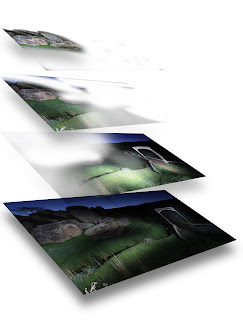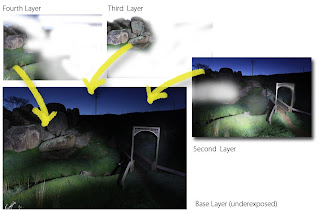 If you are working on lighting a landscape (as in a previous example) you are unlikely to get totally even illumination unless you plan it meticulously and use a laptop on location to check the results as they happen - but it is part of the magic and excitement of messing with added lights while in the field. It's also part of the frustration!
If you are working on lighting a landscape (as in a previous example) you are unlikely to get totally even illumination unless you plan it meticulously and use a laptop on location to check the results as they happen - but it is part of the magic and excitement of messing with added lights while in the field. It's also part of the frustration!In this exercise we did several different 'takes'. All were quite different so I decided to add the four best exposures into one 'master' Photoshop document. The idea is to leave a dark base image as the bottom or background layer than add other layers above that making sure that each has different lighting - this means that when it comes to erasing the dull parts on layer two, for example, what remains is better exposed than the material on the layer directly beneath it.


No comments:
Post a Comment